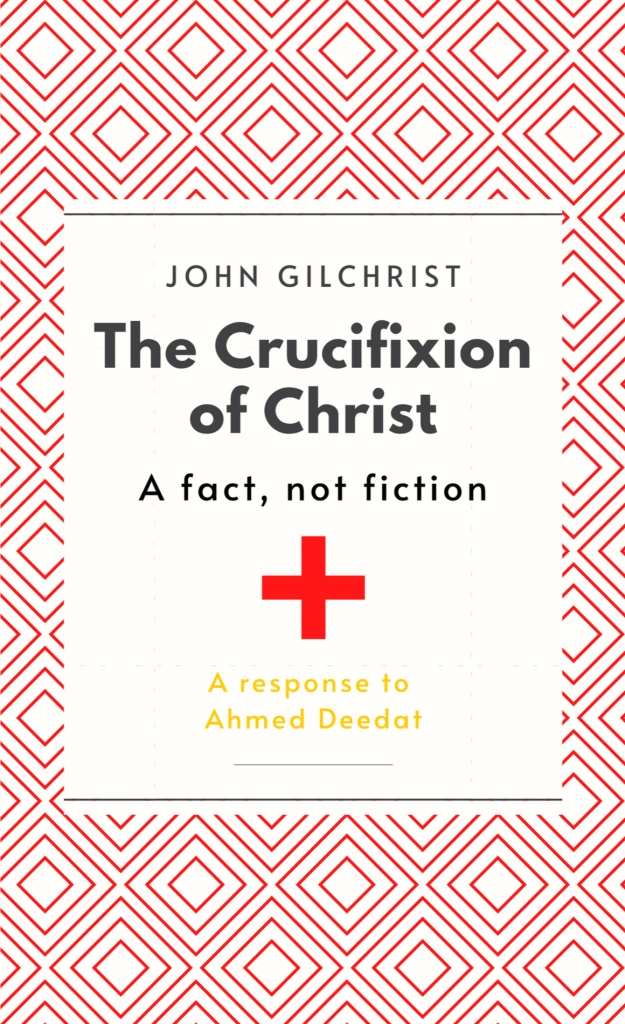Did Jesus Defend Himself at His Trial?
The Crucifixion of Christ: A Fact, not Fiction


Chapters
- Introduction
- Did Jesus Plan an Attempted Coup?
- The Image of Jesus in Deedat's Booklets
- Did Jesus Defend Himself at His Trial?
- The Theory that Jesus Survived the Cross
- Wild Statements in Deedat's Booklet
- Gospel Truths Deliberately Suppressed by Deedat
- Ahmed Deedat's Crucifixion Theory - A Muslim Perspective from Mohammed Bana
« Ch. 3 - The Image of Jesus in Deedat's Booklets
On page 28 of his booklet Deedat attempts to discredit the Gospel records of Jesus' crucifixion further by contesting a prophecy in Isaiah 53:7 which predicted that he would not open his mouth in his defence at his trial but would be led to the cross "as a sheep before its shearers is dumb". It is quite clear from the prophecy that this did not mean that Jesus would say nothing at all once he was arrested but rather that he would not venture to defend himself before his accusers. Deedat's whole argument depends on certain statements made by Jesus which he attempts to draw out as defences made against his accusers.
He attempts to ridicule Jesus by asking whether he spoke "with his mouth closed" when he told Pilate that his kingdom was not of this world (John 18:36), when he called on one of the officers of the High Priest to testify of anything he had said wrongly (John 18:23), and when he prayed to God that, if possible, the cup of suffering he faced might be taken away from him (Matthew 26:39).
It needs to be pointed out that NONE of these statements was made by Jesus during his public trials before the Sanhedrin in the house of Caiaphas the high priest, or before the Roman governor Pontius Pilate. The first statement was made to Pilate during private conversation in the praetorium; the second was made during Jesus' appearance before Annas, the father-in-law of Caiaphas, which was not during his trial before the Sanhedrin as Deedat wrongly suggests (p.28) - the trial only took place after this event in the house of Caiaphas as the Gospels clearly show (John 18:24, Matthew 26:57); and the third was made in the Garden of Gethsemane before Jesus was even arrested. The evidence brought forth by Deedat is therefore totally irrelevant to the point and he proves nothing at all. What does concern us is whether Jesus defended himself either before the Sanhedrin in Caiaphas' house or during his public trial before Pilate. It does not surprise us to find that Deedat overlooks what the Gospels plainly have to say about these two official trials. After hearing the evidence against Jesus before the Sanhedrin, Caiaphas put Jesus on terms to answer his accusers and what transpired is of great importance:
And the high priest stood up and said, "Have you no answer to make? What is it that these men testify against you?" But Jesus was silent. Matthew 26:62-63
Instead of defending himself he promptly testified, in answer to the next question, that he was indeed the Son of God - a testimony that prompted the Sanhedrin to sentence him to death. The important point is that, in answer to his accusers, we read plainly that Jesus was silent. Likewise we read that when Pilate put much the same question to him the same thing transpired. He did not open his mouth to say anything in his own defence.
But when he was accused by the chief priests and elders, he made no answer. Then Pilate said to him, "Do you not hear how many things they testify against you?" But he gave him no answer, not even to a single charge, so that the governor wondered greatly. Matthew 27:12-14
Deedat subtly conceals these incidents which tell us plainly that Jesus was silent before the Sanhedrin when accused by the false witnesses that had been put forward, and that he made no answer not even to a single charge - when accused before Pilate. In his traditional fashion Deedat suppresses the evidences that relate directly to the subject at hand and instead tries to draw arguments from other occasions not relevant to the issues.
It is also interesting to find that exactly the same thing happened when Jesus appeared before Herod, the Jewish king, before being sent back to Pilate.
When Herod saw Jesus, he was very glad, for he had long desired to see him, because he had heard about him, ant he was hoping to see some sign done by him. So he questioned him at some length, but he made no answer. The chief priests and the scribes stood by, vehemently accusing him. Luke 23:8-10
Once again, when Jesus was accused, he made no answer. On every occasion when he was actually on trial before the Sanhedrin, Herod or Pilate, he said absolutely nothing in his own defence and so fulfilled the prophecy of Isaiah that he would not defend himself at his trial by opening his mouth to speak on his own behalf. None of the statements quoted by Deedat was made while Jesus was actually on trial and so yet another of his arguments falls entirely to the ground.